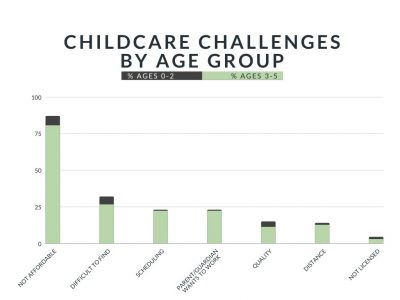Legislative actions taken by city and state lawmakers have put child care on the path to becoming a hot issue for local families.

The Mayor’s Office will conduct its second Boston Childcare Survey alongside this year’s Annual Resident Listing. Meanwhile, a separate bill pushing to establish universal child care in Massachusetts is circulating the statehouse.
The survey is directed toward families with children five and under and aims to collect results indicating how families are adjusting to challenges raised by the pandemic, according to a Thursday press release by the City’s Election Department.
“The feedback we get directly from residents helps us shape how we deliver critical city services so that we can continue to improve the lives of everyone living in Boston,” Mayor Marty Walsh stated in the release. “It’s quick and easy to participate, and I encourage everyone to do their part.”
Feedback from the previous survey revealed serious shortcomings in child care opportunities for Boston families, said Alexandra Valdez, executive director of the Mayor’s Office of Women’s Advancement.
High costs and scheduling issues were among the most widely reported concerns of Boston families, according to the City’s 2019 report.
“The information that we collected, we released in a report called Making Childcare Work, which highlighted the importance of advocating policies for parents, especially those who work outside of the non-traditional hours,” Valdez said.
Nearly 90 percent of respondents with children two and under noted affordability as a challenge, 32 percent reported child care being difficult to find and 23 percent reported scheduling as a challenge.

And while affordability and scheduling continue to obstruct access to child care, those challenges consequently affect women’s opportunity to advance economically, Valdez said. At the same time, the vast majority of child care providers in the United States are women.
Following last year’s child care survey, MOWA partnered with the Department of Small Business Development to establish the city’s Childcare Entrepreneur Fund, which provides grants and support to new and existing businesses.
Valdez said she saw the perfect opportunity for her office to promote gender equity while also improving the city’s child care.
“We wanted to make sure that we were able to find ways of supporting these providers in small businesses, while at the same time making sure that we were helping close that gap and creating more seats,” Valdez said. “When we’re thinking about helping small [child care] providers, we’re also thinking about small businesses.”
Increased access to child care can also benefit women outside the industry, said Boston City Councilor and 2021 mayoral candidate Annissa Essaibi George.
“Having high quality early education centers and child care providers available also gives an opportunity for women, who are often the primary caregivers, to enter or re-enter the workforce,” Essaibi George said.

Although women stand to reap the benefits of overhauling child care, Valdez said this issue affects more people than just women.
“Lack of child care and lack of affordable child care, it’s an issue that affects all of us,” Valdez said. “It’s an issue that needs to be looked at the federal level, an issue that needs to be looked at the state level.”
Legislative action from the state of Massachusetts may be on the horizon, with a recent bill called Common Start — which proposes a statewide system of universal child care — gaining dozens of cosponsors.
If passed, a five-year rollout of public funding would go to providers as aid for operating costs or as subsidies to parents that fully or partially cover the out-of-pocket costs of care.
“This is something that we see as a partnership between all levels of government, but it’s not going to be done in a single bill,” said Andrew Farnitano, communications consultant for the Common Start Coalition. “It’s going to be a multi-year effort by all levels of government.”
That effort may begin as early as Monday, when Farnitano expects discussions among lawmakers to begin.
“We’re looking forward to having a lot of conversations with legislators,” Farnitano said. “We’ll be reaching out to the governor as well as the secretary of early education and care to get their feedback and input as we move through the legislative process and hope they will be supportive.”
But until new funding is greenlit, financial struggles among child care small businesses continue to persist, said Michele D’Ambrosio, director of early learning programs for the East Boston Social Center.
“It is critical that we have funding available to provide accessible affordable high-quality care,” D’Ambrosio said.
She said with the pandemic, costs increased for providers, adding that some programs are “just making ends meet” while others are forced to shut down.
“We need to change the way the government thinks,” D’Ambrosio said. “We need to look at public investment to ensure that there is access to affordable child care.”






























































































































